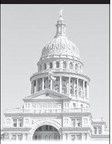Texas lawmakers last week filed more than 1,500 bills ahead of the next legislative session, which begins Jan. 14. The Houston Chronicle reported the proposed measures range from border security to education and other issues.
Republicans have expanded their control of both chambers after flipping several seats during this year’s elections. State Comptroller Glenn Hegar has projected the state will have a $20 billion surplus at the start of the 2025 session.
Among the bills already filed:
• Proposed reduction or elimination of property taxes. State Rep. Cody Vasut, R-Angleton, has filed a bill to eliminate property taxes altogether and create a committee to examine “alternative methods of taxation.” Property taxes raise $81.5 billion annually, meaning their elimination would likely require a marked increase in sales tax. Other proposed bills would use the state’s surplus revenue to partially offset property taxes.
• School vouchers are certain to be considered, since they are a priority of both Gov. Greg Abbott and Lt. Gov. Dan Patrick. Several Republican opponents of vouchers were targeted in the primaries and defeated, making passage of a measure more likely this session, after it failed in 2023.
• Several House Republicans have filed measures to stop providing in-state tuition to some undocumented students living in Texas, effectively eliminating the Texas Dream Act passed in 2001.
• Lawmakers from both parties filed bills that seek to ensure faster responses from utility companies after power outages caused by storms and hurricanes. The measures come after Hurricane Beryl hit Southeast Texas last summer, leaving millions without power for days.
TEA releases final financial accountability ratings
The Texas Education Agency has released its final 2023-24 financial accountability ratings, which show 83% of Texas public schools earned an “A” rating, reflecting “a continued commitment to effective financial management practices so that they can best serve students,” a news release stated.
The ratings are based on annual financial reports submitted by school districts to TEA, with districts getting a letter grade for financial accountability and management. A dozen public school districts and 10 charter schools were rated substandard and given an “F.”
Those districts were Culberson County-Allamoore, Fannindel, Karnes City, Shepherd, Denver City, Tioga, Matagorda, Overton, Hitchcock, Sunray, Dew and Wylie.
Charter schools receiving failing grades for financial accountability were Bexar County Academy, Prelude Preparatory Charter School, Academy of Dallas, Gateway Charter Academy, Education Center International Academy, Texas Preparator y School Westlake Academy Charter School, Rocketship Public Schools, Texas Empowerment Academy and Austin Discovery School.
Readers can look up how school districts in their area fared by going to https://tinyurl. com/3x8ddmab.
Abbott orders college tuition freeze for next two years
The governor sent a letter last week to the state’s public colleges and universities saying he would not support any undergraduate tuition and fee increases over the next two years, extending a tuition freeze already in place. The Austin American- Statesman reported Abbott had discussed the issue with all of the state’s university system boards of regents, who supported the decision.
“Texans face significant rising costs due to inflation,” Abbott wrote in the letter. “When inf lation and other economic pressures burden household budgets, our public universities must take every step possible to ease the financial burden on our students and their families.”
Abbott signed a law in 2023 that stopped tuition and fee increases for the 2023-24 and 2024-25 academic years. His proposal would extend that through 2027.
“I will ensure college affordability remains a top priority for the state as we head into the next legislative session,” Abbott wrote.
Water agreement might bring relief to South Texas
A change to an 80-year-old treaty between the U.S. and Mexico could bring relief to South Texas farmers grappling with a drought and scarce water, according to The Texas Tribune. Under the amended treaty, Mexico now has more options to meet its required water deliveries, which have fallen short in recent years.
Under the 1944 treaty, Mexico must deliver 1.75 million acre-feet of water to the U.S. from six tributaries every five years, a deadline it is at high risk of not meeting. The country still has a balance of more than 1.3 million acre-feet of water that is due by October 2025.
The amendment will allow Mexico to meet its delivery obligations using other tributaries not covered by the original treaty, and by transferring water stored at the Falcon and Amistad international reservoirs.
“What’s more important is we need water transferred at Amistad and Falcon,” said Sonny Hinojosa, a water advocate for Hidalgo County Irrigation District No. 2, which distributes water to ranchers and farmers in the region. “If water gets transferred, they’ll know they’ll have a little bit of water for next year.”
The amendment expires in five years unless extended.
An acre-foot of water is def ined as: The amount of water needed to cover 1 acre (43,560 square feet) with 1 foot of water. One acre-foot is equal to 325,851 gallons of water, enough to cover a football field with a foot of water.
Driest, hottest October in many decades
The drought is back for much of Texas after the driest October since 1952, and the hottest since at least 1895, according to the Texas Water Development Board’s hydrologist, Mark Wentzel. By the end of last month, nearly three-fourths of the state was in drought — up 40 percentage points since the end of September.
Only the northwest corner of the Panhandle and the southern tip of Texas received anywhere near normal precipitation.
Wentzel said the outlook over the next few months is still bleak for rain. The latest seasonal drought outlook from the National Weather Service predicts all of Texas, except that corner of the Panhandle, to be in drought by the end of January 2025.
Borders is a veteran award-winning Texas journalist. He published a number of community newspapers in Texas during a 30-year span, including in Longview, Fort Stockton, Nacogdoches, Lufkin and Cedar Park. Email: gborders@texaspress.com

.png)





